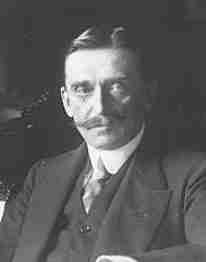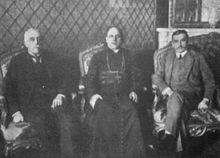Zdzisław Lubomirski
Prince Zdzisław Lubomirski (born April 4, 1865 in Nizhny Novgorod ; † July 31, 1943 on his aristocratic estate Mała Wieś in the Grójec district , Mazovia ) was a Polish aristocrat from the Lubomirskis , a large landowner and politician .
Life
His father, Prince Jan Tadeusz (* September 24, 1826, † April 7, 1908), married to Maria Countess Zamoyska (* 1841, † 1922), was a member of the Polish underground government during the uprising of 1863 and was taken to Nizhny by the tsarist authorities Exiled Novgorod, where Zdzislaw was born as the eldest of his six children. After returning to Congress Poland in 1865, Prince Jan Tadeusz developed large-scale activities as chairman of the Warsaw Charity Society, in banking, where he co-founded the Warsaw credit institution and the Handelsbank, in economics as a researcher of economic history in Poland and in the trade union movement, where he helped found several artisan associations and unions (the shoemaker, the tailor, the leather worker, etc.). The capital also owes him the salvation of the city's landmark, the Sigismund's Column : In 1887, the Russian authorities wanted to demolish the dilapidated 17th-century monument. Prince Jan Tadeusz organized a fundraising campaign in all three parts of Poland, which was able to provide the necessary funds for a new column (it survived until 1944 and was destroyed by the SS after the Warsaw Uprising , so today's 1947 is the third).
Prince Zdzislaw received his training in Krakow and Graz , where he became a Dr. jur. PhD . He returned to Warsaw around 1892 to manage the family's estates. In 1893 he married Countess Maria Branicka († 1934), and the marriage had three children. After his father's death, he took over his offices as chairman of the charity and the institute for ophthalmology. In 1905 he founded together with other moderate conservatives, such as Count Krasiński and Prince Czetwertyński, a new political party, "National Cohesion". Lubomirski, as his father is socially committed, took part in many congresses of elementary school teachers and supported their movement financially.
On August 4, 1915, the fleeing Russian authorities commissioned him to administer the Polish capital and was immediately confirmed as mayor of Warsaw by the new occupation authorities on August 5, after the city was taken by the German troops . His behavior and actions won him great popularity among the population of the capital and the country. I.a. he succeeded in having the forced recruitment of Polish unemployed people for forced labor in Germany for Warsaw, ordered by Governor General Hans von Beseler . He also obtained a better allocation of food for the Polish capital. One saw in him the future head of state. His later involvement in the political work of the so-called activists was less popular. H. Supporters of rapprochement with the German Empire and Austria-Hungary , who wanted to create a Polish state allied with these two powers. The activists were in the minority as Roman Dmowski's National Democratic Party had a large following in all three parts of Poland. In 1917, after the establishment of the reign of Poland , Prince Lubomirski became one of the three regents and held this position until the regency council was dissolved on November 14, 1918. Beseler characterized him in a secret report to Kaiser Wilhelm II (October 13, 1917) as follows: “ Due to tradition and his character traits, Prince Lubomirski is in the anti-Russian camp. But he is just as far removed from full loyalty to the Germans as he is from full support for Poland's cooperation with the Central Powers ” . Lubomirski played an important role in the last weeks of the regency: on October 7, 1918, he wrote an appeal by the Regency Council, which announced the creation of "an independent Polish state with access to the sea" and sworn in the "Polish Armed Forces" a week later the Regency Council, so that General von Beseler was deposed as commander.
For eight years he lived after the political life away until 1926, during the Maiputsches of Marshal Jozef Pilsudski , between this and the President Stanislaw Wojciechowski tried to mediate. After Wojciechowski's departure, the marshal put up Lubomirski's candidacy for president, but the project failed due to resistance from the Sejm marshal , Maciej Rataj , who supported Ignacy Mościcki . In 1928 Lubomirski was elected to the Polish Senate from the list of the ruling party BBWR loyal to Piłsudski and held the office until 1935. After the new constitution came into force, he was nominated as senator by the state president in 1935. Lubomirski openly and sharply criticized the politics of the ruling circles, especially Foreign Minister Józef Beck , which led to his being forced to leave the Senate in 1938. In September 1939 he was a member of the citizens' committee that led the defense of Warsaw. On November 10, 1942, Lubomirski was arrested by the Gestapo and subjected to the strictest interrogation. After two months, his health was completely shattered and he died a few months later on his estate near Grójec in Mazovia.
literature
- Bogdan Graf von Hutten-Czapski , Sixty Years of Politics and Society , I – II., Berlin 1936
- Maria Princess Lubomirska b. Countess Branicka, Pamiętnik 1914–1918 , Posen 2002, ISBN 83-86138-92-0
- Stanisław Szenic, Cmentarz Powązkowski 1790–1850 , Warsaw 1979
| personal data | |
|---|---|
| SURNAME | Lubomirski, Zdzisław |
| BRIEF DESCRIPTION | Polish aristocrat, landowner and politician |
| DATE OF BIRTH | April 4, 1865 |
| PLACE OF BIRTH | Nizhny Novgorod |
| DATE OF DEATH | July 31, 1943 |
| Place of death | Manor Mała Wieś, Powiat Grójecki , Mazovia |

